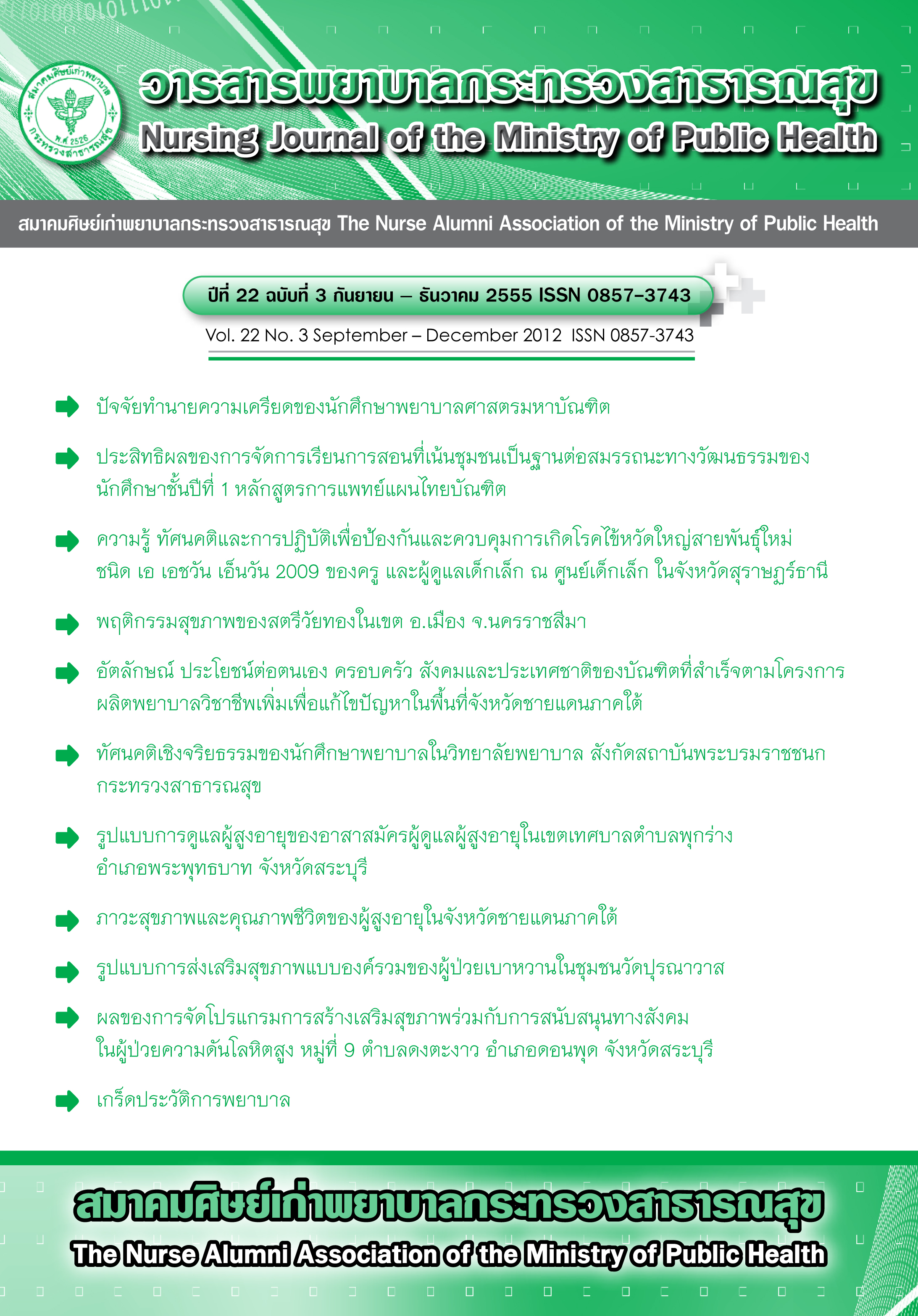ประสิทธิผลของการจัดการเรียนการสอนที่เน้นชุมชนเป็นฐาน ต่อสมรรถนะทางวัฒนธรรมของนักศึกษาชั้นปีที่ 1 หลักสูตรการแพทย์แผนไทยบัณฑิต
Main Article Content
Abstract
บทคัดย่อ
การวิจัยนี้เป็นการวิจัยกึ่งทดลอง แบบกลุ่มเดียววัดผลก่อนและหลัง มีวัตถุประสงค์เพื่อศึกษาประสิทธิผลของการจัดการเรียนการสอนที่เน้นชุมชนเป็นฐาน ต่อสมรรถนะทางวัฒนธรรมของนักศึกษาหลักสูตรการแพทย์แผนไทยบัณฑิต ชั้นปีที่ 1 วิทยาลัยการสาธารณสุขสิรินธร จังหวัดยะลา กลุ่มตัวอย่าง คือนักศึกษาหลักสูตรการแพทย์แผนไทยบัณฑิต ชั้นปีที่ 1 จำนวน 25 คน ได้รับการพัฒนาสมรรถนะทางวัฒนธรรมผ่านกระบวนการเรียนการสอนที่เน้นชุมชนเป็นฐาน ประกอบด้วย 1) การพัฒนาความตระหนักเกี่ยวกับวัฒนธรรม 2) การให้ความรู้เกี่ยวกับความหลากหลายของ ความเชื่อ และวัฒนธรรม 3) การส่งเสริมทักษะทางวัฒนธรรมในการประเมินผู้รับบริการที่มีความแตกต่างทางความเชื่อและวัฒนธรรม 4) การส่งเสริมความสามารถในการดูแลผู้รับบริการที่มีความแตกต่างทางความเชื่อและวัฒนธรรม และ 5) การพัฒนาความปรารถนาที่จะมีสมรรถนะทางวัฒนธรรมในการทำงานวิชาชีพแพทย์ไทย เครื่องมือที่เก็บรวบรวมข้อมูล คือ แบบสอบถามวัดสมรรถนะทางวัฒนธรรม การวิเคราะห์ข้อมูลใช้สถิติเชิงพรรณนา และสถิติทดสอบค่าเฉลี่ยของประชากร 2 กลุ่มสัมพันธ์กัน (Pair t-test)
ผลการประเมินสมรรถนะทางวัฒนธรรมของนักศึกษา พบว่า ก่อนเข้าร่วมโปรแกรมการจัดการเรียนการสอนที่เน้นชุมชนเป็นฐานในรายวิชากายวิภาคและสรีรวิทยา นักศึกษาร้อยละ 92.0 มีความตระหนักในสมรรถนะทางวัฒนธรรม มีเพียงร้อยละ 8.0 มีสมรรถนะทางวัฒนธรรม หลังจากเข้าร่วมโปรแกรม นักศึกษาร้อยละ 84.0 มีสมรรถนะทางวัฒนธรรม เมื่อเปรียบคะแนนสมรรถนะทางวัฒนธรรมก่อนและหลังเข้าร่วมโปรแกรม พบว่า หลังเข้าร่วมโปรแกรมนักศึกษามีสมรรถนะทางวัฒนธรรมสูงกว่าก่อนเข้าร่วมโปรแกรมอย่างมีนัยสำคัญทางสถิติที่ระดับ .05 (หลังทดลอง = 65.48, S.D. = 5.09 และก่อนทดลอง= 52.32, S.D. = 5.07) สรุปได้ว่ากระบวนการจัดเรียนการสอนที่เน้นชุมชนเป็นฐานมีประสิทธิผลในการพัฒนาสมรรถนะทางวัฒนธรรมของนักศึกษา เพราะความสามารถในการให้บริการทางการแพทย์และสาธารณสุขที่มีประสิทธิภาพ ผู้ให้บริการจำเป็นต้องมีสมรรถนะทางวัฒนธรรม การขาดความเข้าใจในวัฒนธรรมจะส่งผลเสียต่อการเข้าถึงและประสิทธิภาพทางการรักษาพยาบาล
คำสำคัญ: การจัดการเรียนการสอนที่เน้นชุมชนเป็นฐาน, สมรรถนะทางวัฒนธรรม
Abstract
This quasi-experimental research: a “one group pre-post test design” aimed to evaluate the effectiveness of community based learning on cultural competence among first year Thai Traditional Medicine students of Sirindhorn College of Public Health, Yala. Sample was 25 first year Thai Traditional Medicine students, who were improved cultural competence through community based learning. The community based learning included: (1) to improve student cultural awareness, (2) to improve student knowledge of diverse cultures and practices, (3) to improve the student’s skill in the assessment of clients from diverse cultures and practices, (4) to improve the student’s ability to develop treatment plans for clients from diverse cultures, and (5) to develop the desire for cultural competency on Thai Traditional Medicine Profession. The research instrument was Inventory for Assessing the Process of Cultural Competence among Healthcare Professionals-Student Version. Descriptive statistics and the paired-sample t test were used to compare the change in cultural outcome.
The results for assessment of cultural competence among students found that before students participated community based learning through anatomy and physiology course, 92.0% of students had cultural awareness and only 8% had cultural competence. After they participated community based learning, 84% of them had cultural competence. When compared mean score of cultural competence between before and after participated community based learning, mean score of cultural competence after participated community based learning was statistically significant higher than that mean score before participated community based learning at p-value < .05 ( after: = 65.48, S.D. = 5.09 and before: = 52.32, S.D. = 5.07). The finding indicated that the community based learning effectively improved cultural competence among students. Because healthcare personnel provide effective care, they must have cultural competence. If healthcare providers are lack of cultural competence, it would affect to accessibility and effective care.
Keywords: Community Based Learning, Cultural Competence
Article Details
บทความและรายงานวิจัยในวารสารพยาบาลกระทรวงสาธารณสุข เป็นความคิดเห็นของ ผู้เขียน มิใช่ของคณะผู้จัดทำ และมิใช่ความรับผิดชอบของสมาคมศิษย์เก่าพยาบาลกระทรวงสาธารณสุข ซึ่งสามารถนำไปอ้างอิงได้

